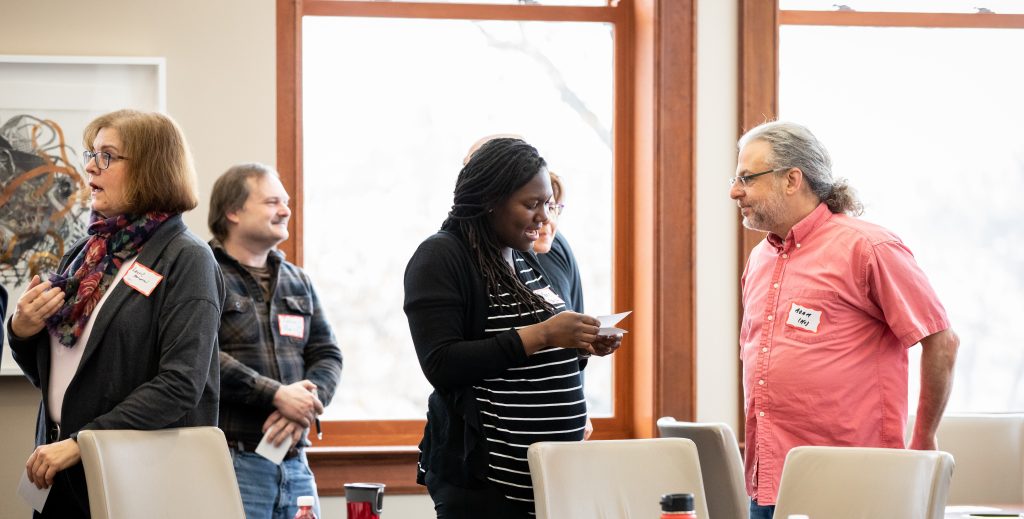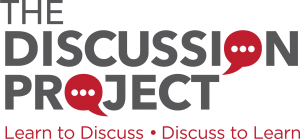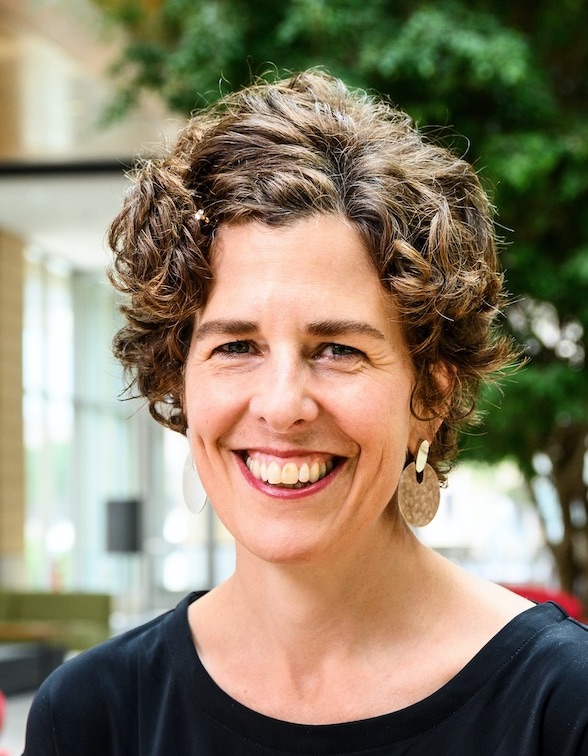
New in-person courses will run in June and August 2026.

The aim of this professional development series is to strengthen our campus-wide capacity to create welcoming, engaging, and academically rigorous classroom environments in which students experience productive classroom discussions on important issues and topics.
Our Mission
Engaging discussions are one of the most rewarding and memorable activities that students and faculty alike can experience in the classroom. Recent research shows that classroom discussion deepens learning, creates community, and helps students form an academic identity.
At the same time, classroom discussion is a challenging pedagogical undertaking. It requires the instructor to orchestrate learning among a group of students who likely do not know each other, come from a diversity of backgrounds, possess a range of political commitments, arrive with varying levels of familiarity with the course material, and have different levels of comfort speaking in class.
Inviting students to discuss also comes with some risk because we don’t know what students are going to say. That unknown means that the instructor will have to be ready to follow one student’s interesting and unexpected line of thought, correct another’s misunderstanding about the material, and also be prepared to respond to any number of possibly off-topic, inappropriate, hostile, or naïve comments.
To address these promises and challenges, the School of Education has designed a professional development program for UW faculty and teaching staff. See the Program Overview page for more details.
Note: if you are visiting this page and are at an institution other that UW-Madison and would like The Discussion Project to come to your campus, please go to our nonprofit website thediscussionproject@wceps.org

Professor Kathy Cramer
Political Science, UW-Madison
I was fortunate to take part in your training last month. I am not exaggerating when I say it has changed my life. I am teaching a 15-person and a 50-person undergraduate course this term, and I am using the skills you taught me each class session. It has made me think differently about my teaching and I am quite sure the students’ experience is all the better for it. Thank you! You all are providing a fantastic service.
Discussion Project Alumni Receive Awards
Congratulations to the following Discussion Project alumni for receiving a Distinguished Teaching Award! For more information about Distinguished Teaching Awards, visit the Office of the Secretary of the Faculty’s website.
| Seth Pollak | Evelyn Howell | Martha Alibali | David Zimmerman | Lisa Naughton |
| Michel Wattiaux | Gilbert Nathanson | Kelley Conway | Jenny Saffran | Wei Dong |
| Tracy Schroepfer | John Zumbrunnen | Karyn Riddle | Anja Wanner | Sissel Schroeder |
| John Hall | David Baum | Jill Casid | Linn Posey-Maddox | Andrea Arpaci-Dusseau |
| Sandra Adell | Ralph Grunewald | Claire Wendland | Michael Thornton | Nancy Marshall |
| Jerome Camal | Majid Sarmadi | Erica Simmons | Sara McKinnon | Kristin Shutts |
| Lori Lopez | Kate Vieira | Jennifer Ratner-Rosenhagen | Mitra Sharafi | Jeremy Morris |
| Ajay Sethi | Yoshiko Herrera | Rosemary Russ | Catalina Toma | Judith Houck |
| Joshua Calhoun | Juan Egea | Kassem Fawaz | Diego Roman | Lyn Van Swol |
| Margaret Kerr | Annie Menzel | Aurelie Rakotondrafara | Sarah Ensor | Neil Kodesh |
| Jennifer Gaddis | Kerri Coon | Amy Trowbridge | Katie Eklund | |
We also want to congratulate the following alumni for other teaching-related awards they have won:
- John Surdyk, Gaumnitz Teaching with AI Award in the Wisconsin School of Business
Media Highlights
- UW-La Crosse CATL Cast podcast episode 2.1: We’re growing, we’re learning, we’re exchanging ideas. – October, 2025
- PBS Here and Now: Chancellor Jennifer Mnookin on Civil Discourse at UW-Madison – October 24, 2025
- With the Wisconsin Exchange, UW–Madison is strengthening a culture of civil dialogue across difference – October 22, 2025
- Close to Home: Bringing discussions back into the classroom – April 14, 2025
- The Wisconsin School of Business Engages Students with Discussion Project Techniques
by Teresa Nelson, The Discussion Project November 12, 2024 - Repairing Campus Dialogue: Trying to teach students to tolerate disagreeable speech – March 28, 2023
- Chancellor Jennifer Mnookin addresses the Board of Regents (37:23-38:51) – February 9, 2023
- Surveys reinforce UW–Madison’s longstanding commitments to free speech, civil dialogue and belonging – February 1, 2023
- The Discussion Project gives instructors vital skills to improve quality classroom discussion, learning – July 13, 2022
- World-Class Instructional Design and Assessment (WIDA) interviews the Discussion Project – February 7, 2022
- UW project prepares instructors to teach better online courses – December 11, 2021
- Mellon Foundation bolsters support for the Discussion Project – Summer 2019
- ‘The Discussion Project’ cultivates engaging, welcoming classroom conversations across campus – February 7, 2018
- ‘Badger Herald’ Puts Spotlight on ‘the Discussion Project’ – September 22, 2017
- School of Education launches new program aimed at fostering productive discussion – September 19, 2017
- UW Discussion Project Aims to Get People Talking Across Racial Lines – May 31, 2017
- Project Aims to Create Engaging, Welcoming Classroom Discussions – May 16, 2017
Affiliation of Participants: 119 Departments and Programs
| Accounting and Information Systems | Aerospace Studies (Air Force ROTC) | African Cultural Studies | African Studies Program | Afro-American Studies | Agricultural and Applied Economics | Agroecology |
| American Indian Studies | Animal Sciences | Anthropology | Art | Art History | Asian Languages and Cultures |
Asian Studies—Center for South Asian Studies
|
| Astronomy | Atmospheric and Oceanic Sciences | Bacteriology | Biochemistry | Biocore | Biological Systems Engineering | Biology |
| Biomedical Engineering | Biostatistics and Medical Informatics | Botany | Business | Cell and Regenerative Biology | Center for Asian Studies—South Asian Studies |
Chemical and Biological Engineering
|
| Chemistry | Chicana/o and Latina/o Studies | Civil and Environmental Engineering | Civil Society and Community Studies | Classical and Ancient Near Eastern Studies | Communication Arts |
Communication Sciences and Disorders
|
| Community and Environmental Sociology | Computer Sciences | Consumer Science | Continuing Studies | Counseling Psychology | Curriculum and Instruction | Dairy Science |
| Dance | Design Studies | Economics | Educational Leadership and Policy Analysis | Educational Policy Studies | Educational Psychology |
Electrical and Computer Engineering
|
| Engineering Physics | English | Entomology | Family Medicine | Finance, Investment and Banking | Food Science |
Forest and Wildlife Ecology
|
| French and Italian | Gender and Women’s Studies | Genetics | Geography | Geoscience | German, Nordic, and Slavic | History |
| History of Science, Medicine, and Technology | Horticulture | Human Development and Family Studies | Integrated Liberal Studies | Integrative Biology | Interdisciplinary Theatre Studies | International Studies |
| Jewish Studies | Journalism and Mass Communication | Kinesiology | Language Sciences | Law | Legal Studies |
Letters & Science Honors Program
|
| Library and Information Studies | Life Sciences Communication | Management and Human Resources | Marketing | Materials Science and Engineering | Mathematics | Mechanical Engineering |
| Medical History and Bioethics | Medical Physics | Medicine | Military Science (Army ROTC) | Music | Naval Science (Naval ROTC) |
Nelson Institute for Environmental Studies
|
| Nursing | Nutritional Sciences | Occupational Therapy | Operations and Information Management | Pathobiological Sciences | Pediatrics | Pharmacy |
| Philosophy | Physical Therapy | Physics | Planning and Landscape Architecture | Plant Pathology | Political Science |
Population Health Sciences
|
| Psychology | Public Affairs | Radiology | Real Estate and Urban Land Economics | Rehabilitation Psychology and Special Education | Religious Studies |
Robert M. La Follette School of Public Affairs
|
| Social Work | Sociology | Soil Science | Spanish and Portuguese | Special Education | Statistics |
Wisconsin Institute for Science Education and Community Engagement
|
The funding for this project is provided by the Division of Teaching & Learning at UW-Madison and the Wisconsin Center for Education Products and Services.
